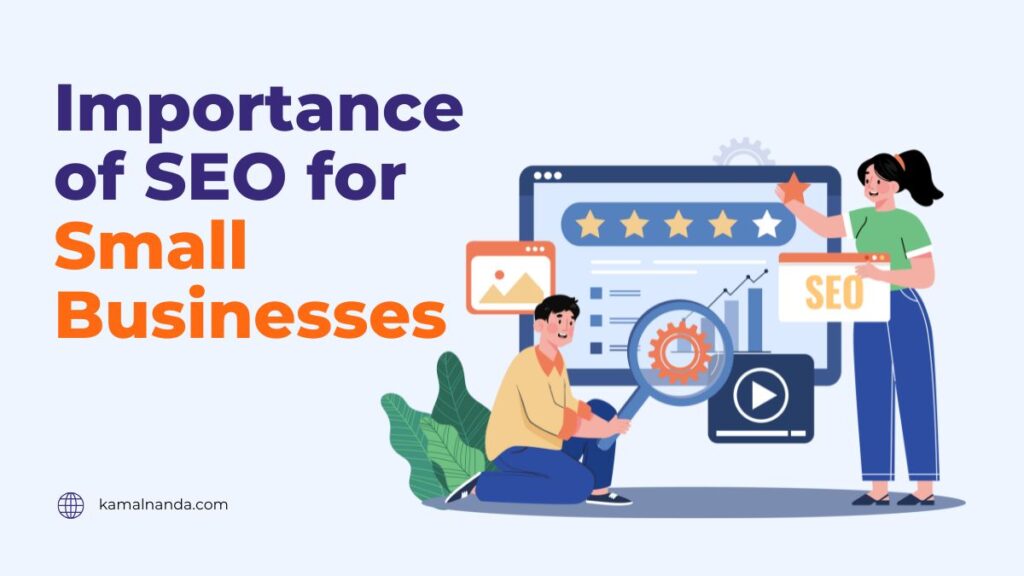Discover the importance of SEO for small businesses. Learn how it helps boost visibility, attract customers, and drive growth in today’s competitive online market
SEO (Search Engine Optimization) helps your business show up online when people are looking for what you offer. It’s like putting up a big, clear sign that directs customers to your store. Without SEO, your website might get lost, but with it, you can show up higher in search results, making it easier for people to find you.
Here’s something to think about: 93% of online experiences start with a search, and most people don’t go past the first page. If your business isn’t on that first page, you could be missing out on customers.
In this post, we’ll explain why SEO is a game-changer for small businesses and how it can help you grow by making it easier for people to discover you.
Statistics for SEO for Small Businesses
Here are some key statistics that highlight the importance of SEO for small businesses:
| Statistic | Explanation |
|---|---|
| 75% of people never go past the first page of search results. | Ranking on the first page is crucial for visibility. |
| 53% of website traffic comes from organic search. | Most visitors find websites through search engines, not ads. |
| 70-80% of users ignore paid ads and click on organic results. | People trust organic results more than ads. |
| SEO leads have a 14.6% close rate, while ads only have a 1.7% close rate. | SEO helps turn leads into customers more effectively. |
| 75% of people make a purchase after a local search on their mobile. | Local SEO is key if your business serves local customers. |
| Businesses that blog get 55% more website visitors. | Blogging regularly helps bring more traffic to your site. |
| 93% of online experiences start with a search engine. | Most people begin their search for products or services online. |
| 61% of marketers say SEO is their top priority. | SEO is a major focus for businesses wanting to grow online. |
These stats show that SEO can really help small businesses get noticed, drive traffic, and increase sales.
Importance of SEO for Small Businesses
Want to boost your small business and stand out online? Learn why SEO is the game-changer you can’t afford to ignore!
Increased Organic Traffic
How SEO Helps: SEO helps your website show up in search results when people look for your services.
Impact of Higher Rankings: The higher you rank, the more people will click on your website.
Benefits: Organic traffic is free and brings in people who are really interested in what you offer.
Pro Tip: Use long-tail keywords like “best chocolate cake near me” to attract people ready to buy.
Enhanced Brand Visibility
Why It Matters: SEO makes your business easier to find, which helps more people recognize your brand.
How It Works: Ranking high shows you’re a trustworthy source, building authority in your field.
Reaching More People: SEO helps you reach people who might not know about your business.
Pro Tip: Create helpful content like blogs or guides to answer questions people are searching for.
Improved Local SEO
Local Search Optimization: Google My Business helps your business show up in local searches.
Attracting Local Customers: Local SEO helps your business show up when people search in your area.
Foot Traffic: Good local SEO brings more people into your physical store.
Pro Tip: Update your Google My Business regularly and ask happy customers to leave reviews.
Higher Conversion Rates
Optimizing for Conversions: SEO helps make your website easier to navigate, which makes people more likely to take action.
Targeting Ready Buyers: SEO attracts people who are already looking to buy your products or services.
Improving UX: A fast, easy-to-use website makes visitors more likely to convert into customers.
Pro Tip: Make your calls-to-action clear so visitors know exactly what to do next.
Cost-Effective Marketing
Long-Term ROI: SEO brings lasting results, unlike paid ads that stop when you stop paying.
Ongoing Organic Traffic: Once your website ranks, it keeps bringing in free traffic.
Maximizing Budget: SEO helps you get more for your marketing budget with long-term results.
Pro Tip: Focus on long-term content strategies like blog posts that can keep bringing in traffic over time.
Better User Engagement
User Experience Matters: SEO improves your website’s usability, so visitors stay longer and engage more.
Faster Websites Convert Better: A quick-loading website keeps people from leaving before they can take action.
Mobile-Friendly Sites: Many people browse on mobile, so optimizing for mobile is key.
Pro Tip: Check your site’s speed and mobile-friendliness with tools like Google’s PageSpeed Insights.
Competitive Advantage
Outranking Competitors: SEO helps you beat competitors who aren’t focusing on their online presence.
Tracking Competitors: By seeing where your competitors rank, you can adjust your strategy to outrank them.
Stand Out in Your Market: SEO helps you create a unique position in your market.
Pro Tip: Use SEO tools like SEMrush or Ahrefs to see where your competitors rank and how to beat them.
Improved Mobile Experience
Mobile Optimization: SEO ensures your website works well on mobile devices.
Higher Google Rankings: Google ranks mobile-friendly websites higher in search results.
Better User Experience: A mobile-optimized website improves the chances of visitors staying and converting.
Pro Tip: Ensure your website is responsive so it looks good on all devices.
Better Analytics and Insights
Track Performance: SEO tools help you track what’s working and what needs improvement.
Data-Driven Decisions: You can see which pages are bringing in the most visitors and adjust your content accordingly.
Key Metrics: Metrics like bounce rate and conversion rate help you understand how visitors interact with your site.
Pro Tip: Regularly review your analytics to see where you can improve your SEO strategy.
Enhanced Customer Trust and Loyalty
Online Reputation: SEO helps you manage reviews and customer feedback, which builds trust.
Building Trust: Positive reviews and high-quality content make your business seem more reliable.
Long-Term Loyalty: A strong online presence helps customers stay loyal to your brand.
Pro Tip: Encourage customers to leave reviews on Google and Yelp to boost your rankings and reputation.
Best Small Business SEO Tools
Here’s a more detailed breakdown of the best small business SEO tools, along with some pro tips:
Google Analytics
Pro Tip: Set up Goals to track actions like form submissions or purchases for better insights.
Yoast SEO (for WordPress)
Pro Tip: Use Yoast’s Readability Checker to make your content easier to read for better SEO.
SEMrush
Pro Tip: Use SEMrush Position Tracking to monitor keyword performance.
Ahrefs
Pro Tip: Use Ahrefs Content Explorer to find trending topics in your niche.
Moz
Pro Tip: Use Moz’s Link Explorer to analyze competitor backlinks for opportunities.
Ubersuggest
Pro Tip: Use Ubersuggest to find your competitor’s best keywords and try to rank for them.
Google Search Console
Pro Tip: Check the Coverage Report to fix any indexing errors.
8. BuzzSumo
Pro Tip: Use BuzzSumo to create content around popular topics that your audience is searching for.
Screaming Frog
Pro Tip: Use Screaming Frog’s Custom Search to find specific SEO problems like missing alt text.
Answer The Public
Pro Tip: Create blog posts or FAQs that answer these questions to boost SEO.
Bonus: Canva for SEO Graphics
These tools are great for small businesses to improve SEO without needing a big budget. Regular use will help improve your site’s rankings and traffic.
Must Check: Difference Between SEO and PPC
Common SEO Mistakes Small Businesses Make?
Here are some common SEO mistakes small businesses make, with simple tips to fix them:
Ignoring Keyword Research
If you don’t know the right keywords, people won’t find you online.
Fix it
Pro Tip: Keep track of how your keywords are doing and adjust if needed.
Neglecting Mobile Optimization
If your website isn’t mobile-friendly, people will leave quickly, and your ranking can drop.
Fix it
Pro Tip: Speed up your site by reducing large images and unnecessary plugins.
Skipping Local SEO
You could miss out on nearby customers searching for your business.
Fix it
Pro Tip: Ask happy customers for reviews on Google to boost local rankings.
Overusing Keywords (Keyword Stuffing)
Too many keywords make your content look weird and hurt your ranking.
Fix it
- Write naturally, using keywords where they make sense.
- Use related words and phrases.
Pro Tip: Use tools like Yoast SEO to help keep your keyword use balanced.
Slow Website Speed
Slow websites lose visitors and can drop in search rankings.
Fix it
Pro Tip: Use Google’s PageSpeed Insights to check and improve your website speed.
Not Updating Content Regularly
Old content can make your website seem outdated.
Fix it
Pro Tip: Update old posts by turning them into something new, like a video or infographic.
Ignoring Analytics
If you don’t track your performance, you won’t know what’s working or not.
Fix it
Pro Tip: Set goals in Google Analytics to track things like sales or form submissions.
Lack of Quality Backlinks
Without backlinks, search engines may not trust your website.
Fix it
Pro Tip: Use tools like Ahrefs to check if your backlinks are from reliable sites.
Forgetting Meta Tags and Descriptions
Missing or poor meta tags can hurt your visibility in search results.
Fix it
Pro Tip: Keep your meta descriptions under 160 characters to avoid being cut off in search results.
No Clear Site Structure
A messy site can confuse both visitors and search engines.
Fix it
Pro Tip: Link related pages together to help visitors and search engines find their way around your site.
By fixing these common SEO mistakes, you can improve your site’s ranking and attract more visitors.
These easy tips will help you improve your SEO!
How Kamal Nanda Can Help?
I specialize in helping small businesses grow through effective SEO strategies and digital marketing. Here’s how I can help:
SEO Optimization
I can guide you in improving your website to rank better on search engines, bringing in more visitors. This includes:
Keyword Strategy
I help you find the right keywords to target so you reach your ideal customers. This includes:
Website Audits
I will check your website for SEO problems and fix them to help you improve your online presence. This includes:
Content Marketing
I’ll help you create engaging content that is also SEO-friendly to drive traffic and build your brand. This includes:
Local SEO
If you run a local business, I focus on local SEO to help you get found by nearby customers. This includes:
These simple strategies will help improve your website’s SEO, attract more visitors, and grow your business.
Most Successful Case Study: Small Business Growth through SEO
Ever wondered how small businesses turn their websites into powerful customer magnets? Discover the secrets behind one of the most successful case studies of small business growth through SEO!
Case Study
Small Retail Business Success
Background
A small retail business selling handmade jewelry had low website traffic, and their sales were not growing.
My Strategy
Result: In 6 months, the business saw:
I can help your small business grow by using proven SEO strategies that get real results. Let’s work together to improve your online presence and increase sales.
Final Thoughts
SEO is key for small businesses to grow online. With the right strategy, you can get more visitors, boost sales, and build your online presence without spending too much.
Key Takeaways
Let’s get started! Together, we can make SEO work for your business!


